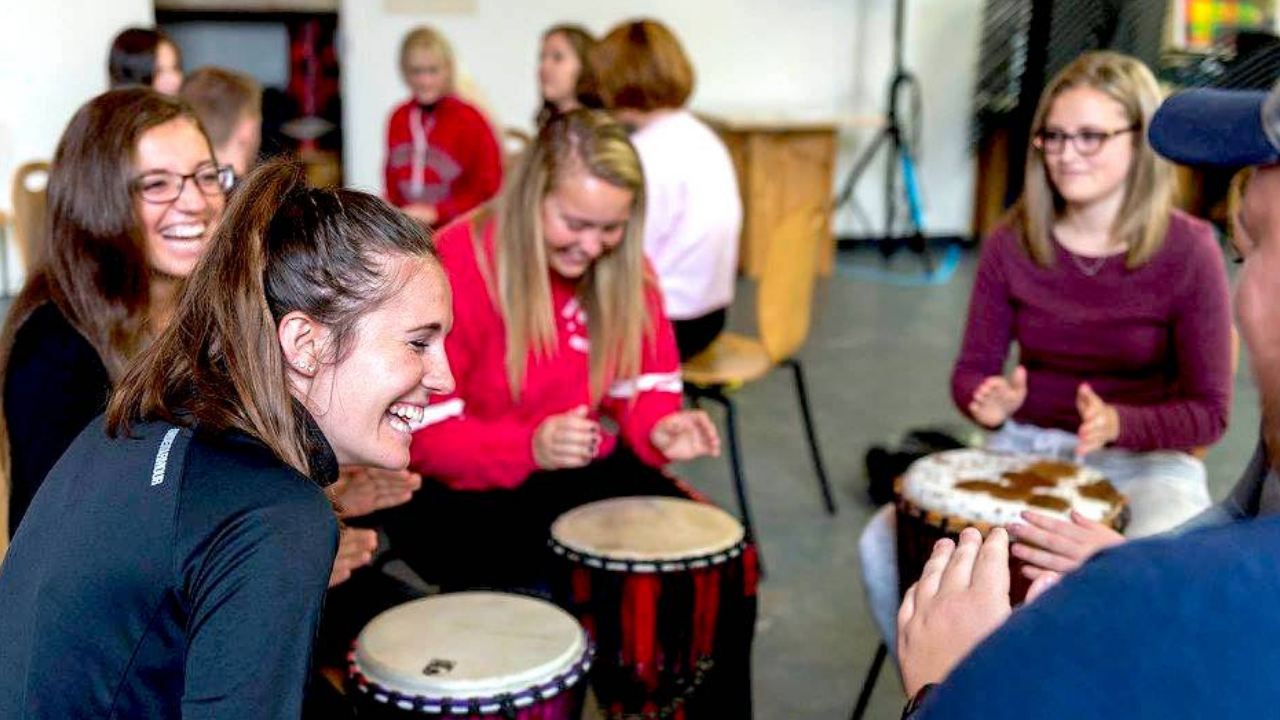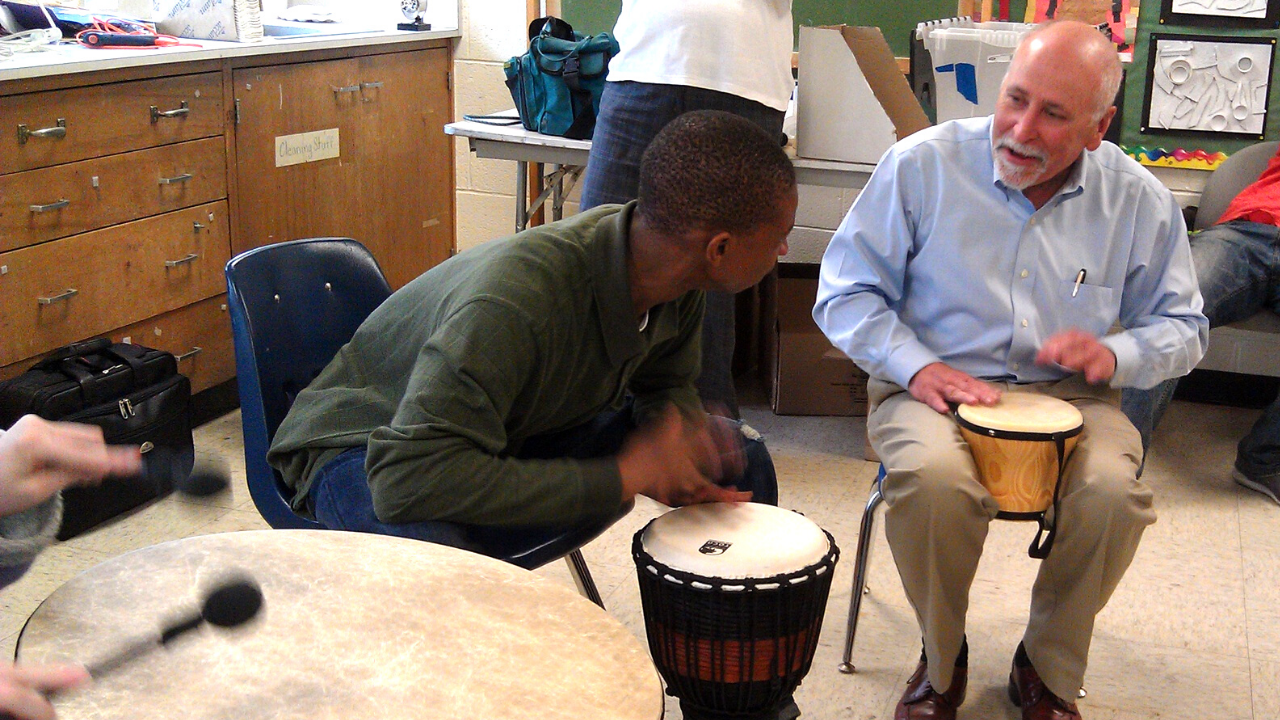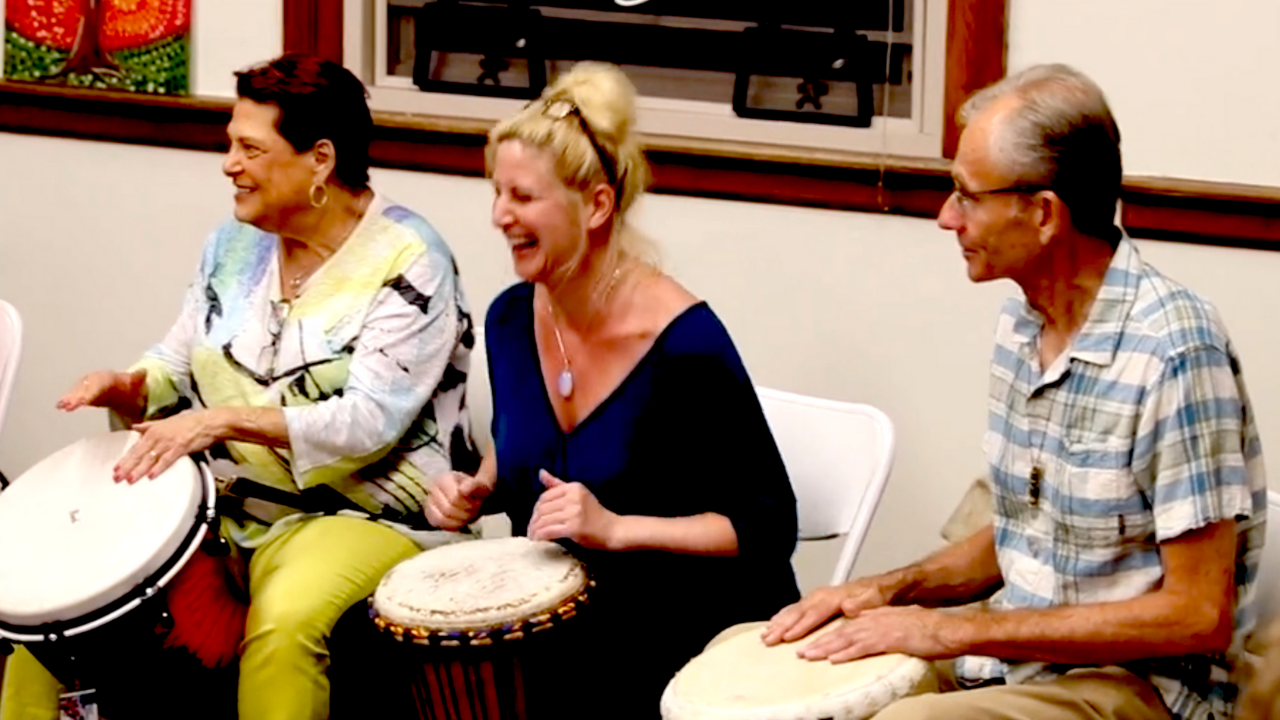11 Reasons to Start Drumming for Better Health

Drumming is an ancient art form that has been popular for thousands of years for its therapeutic effects. There are a variety of health benefits associated with drumming, from calming stress and improving mental clarity to boosting immunity and honing motor skills.
In fact, the number of research studies on the health benefits of drumming continues to grow each year.
But what some people don’t realize is that the wellness benefits of drumming don’t require you to be “good” at drumming. That’s because the benefits happen by simply engaging in the process of a rhythmic activity.
Just by being willing to try drumming, you can open a whole new world of fun, relaxation and even friendship!
That’s why today I’m sharing my top 11 health benefits of drumming with you.
The healing power of drumming
 Jim Donovan's Music and Wellness class at Saint Francis University
Jim Donovan's Music and Wellness class at Saint Francis University
Playing drums for even a few minutes has been shown to boost one’s mood and make them feel more positive.
What you may not realize is that drumming offers tons of health benefits. Among them, the most notable are improved heart rate and decreased stress levels.
Drumming also releases endorphins, the body's natural feel-good chemical, while providing physical stimulation to the entire body.
Additionally, sound vibrations generated by drumming have been said to help clear away negative emotions and create a sense of calm. It can even help boost mental focus and attention span along with promoting feelings of well-being.
In my years of leading drumming events, I can confidently say that I witness and experience this kind of healing on a weekly basis.
Examples include:
- Seeing a young man in my group drumming circle with a heroin addiction—just out of detox—transform from completely disengaged to smiling and sociable within 30 minutes of drumming…
- Or the 83 year old woman at a senior living facility with Alzheimer’s who “woke up” from her lethargy upon hearing the rhythms of our percussion tubes…
- Or chatting with my friend Jill who uses drumming to soothe her early onset Parkinson’s symptoms…
Though not a miracle "cure", drumming can greatly improve one’s quality of life.
And it doesn’t seem to matter what “kind” of person you are.
I’ve drummed with thousands of people since the mid 1980’s. In that time I’ve led more than 3000 events with all kinds of people—older adults, kids, corporate execs, incarcerated people, and college students to name a few.
But however interesting it might be to read anecdotes, it’s also important to explore the science supporting how drumming affects health and well being.
Now let's look at a brief overview of what the research is revealing about the health benefits of drumming.
Why miss out on a single article when you can get them delivered straight to your inbox for free?
100% Free. Unsubscribe anytime. Regular member discounts.
11 Research Based Health Benefits of Drumming

A behavioral healthcare professional working on attention to-task with a boy with Autism
What follows are several key ways that drumming can improve health and well being along with links to the research.
Improves Blood Circulation
A study published in the Journal of Cardiovascular Medicine found that drumming helped improve blood circulation. It's believed that the rhythmic movement of the hands and feet helps stimulate the flow of blood through the veins and arteries.
Boosts Immunity
Drumming is an ancient art form that has been popular for thousands of years for its therapeutic effects. There are a variety of health benefits associated with drumming, from calming stress and improving mental clarity to boosting immunity and honing motor skills. Drumming is used as an alternative therapy for people with various ailments. They may help boost immunity by increasing the production of white blood cells. These cells fight off infections and diseases.
Reduces Inflammation
In a 2016 study published in PLOS One, during a 10 week drumming program with mental health service users, participants showed a decrease in depression symptoms, an increase in social resilience and a significant shift away from a pro-inflammatory towards an anti-inflammatory immune profile.
Boosts Mood
This 2014 study published in The Arts in Psychiatry reported significant positive effects on university students’ scores along all five spectrums of affective state (i.e., wide awake–drowsy, relaxed–anxious, cheerful–depressed, friendly–aggressive, and clear-headed–confused).
Better Cognitive Functioning
A 2014 study published in the Journal of Huntington's Disease reported that after two months of drumming training, improvements in executive function, cognitive enhancement and enhancements in the brain’s white matter were observed.
Reduce Parkinson’s Disease Symptoms
This 2016 pilot study reported a 12 week drumming program significantly and reversibly improved quality of life in patients with PD
Relieves Stress and Anxiety
Drumming is a great way to reduce stress and boost your mood. One of the most common reasons people drum together or alone is for reliable stress reduction. This 2018 study reports that a 10 week drumming series improved qualitative measures of well-being, agency, mood and social connection. And another 2016 study found that group hand drumming effectively relieved anxiety and depression. The rhythmic nature of drumming has been found to relax tense muscles and activate the body’s relaxation response. This can help manage symptoms of anxiety, depression, and even PTSD. Additionally, drumming helps create an endorphin rush that produces feelings of pleasure and happiness - making it a powerful tool for dealing with stress and improving one's overall wellbeing.
Reduces Pain
A 2012 University of Oxford study looking at drumming and music performance’s effect on pain and mood concluded that active, vigorous performance of music can lead to an Increased pain tolerance. This comes from a release of endorphins that produce a similar euphoria to opioids – without the risk of overdose. According to this study, continuous drumming likely triggers an euphoric endorphin release in the central nervous system.
Boosts Social Connection
According to this collection of studies reported in the International Journal of Special Education,, recreational group drumming provided significant improvements in social-emotional behaviors in low-income children who engaged in contemporary drum circles and group counseling.
Improves Attention-to Task in Children with Autism
Drumming can help improve your concentration and focus. When you keep a steady rhythm, it takes your mind off distracting thoughts, helping you to stay in the moment and center on the task at hand. This allows you to more easily stay focused and break through any mental blocks or negative thinking patterns that may be preventing you from fully reaching your potential. Additionally, research has found that drumming can improve key aspects of cognitive functioning such as working memory and speed of processing information
In a 2011 study I was a part of at Saint Francis University, we found that percussion, when used as a clinical intervention, positively impacts the length of time a client with Autism will sustain attention-to-task.
Improved Cognitive Function In People with Dementia
This 2020 study concluded that drumming improved cognitive function and upper limb motion range, and changes in body composition. The results suggest that drumming could be used as a way to promote exercise and improve various health and cognitive functions.
How to get started drumming

Adults learning to drum at a Jim Donovan drumming event
All it takes to start drumming is willingness to try.
If you have your own drum then great! If not you can easily start by drumming on your lap or a pillow.
Drumming can be as informal as grabbing a couple of wooden spoons from the kitchen, turning on your favorite groove heavy music playing along the best you can. If you need some music suggestions, here’s a playlist I made for you.
That was my exact “practice” regimen for 3 years when I first started!
You can also search online for a local drum circle or local drum lessons.
If you’re looking for a way to use rhythm to relax, here’s my favorite rhythm for relaxation and sleep exercise.
Lastly, I believe that drumming is for everyone.
No matter what you may have been told in the past, musical expression is your right. We all start at the beginning when trying something new and so I encourage you to give drumming a try and see for yourself.
You might be surprised at how good you can feel!
Recommended: Our post popular posts
Healing the Body with Frequencies: The Basics Explained
Stimulating the Vagus Nerve for Better Sleep, Stress Relief & Health
Rain Sounds For Sleep, Rest Easy With Nature
Music Healing for Stress, Anxiety and Pain
Benefits of Vagus Nerve Exercises & 7 Simple Practices
The Five Longevity Secrets of “SuperAgers”
Vagus Nerve Exercises for Stress and Anxiety Relief
Sources:
African drumming: a holistic approach to reducing stress and improving health? https://pubmed.ncbi.nlm.nih.gov/24983262/
Recreational music-making modulates natural killer cell activity, cytokines, and mood states in corporate employees https://pubmed.ncbi.nlm.nih.gov/17261984/
Effects of Group Drumming Interventions on Anxiety, Depression, Social Resilience and Inflammatory Immune Response among Mental Health Service Users https://journals.plos.org/plosone/article?id=10.1371/journal.pone.0151136
Immediate effects of group-based wellness drumming on affective states in university students https://www.sciencedirect.com/science/article/abs/pii/S0197455614000537
Improved Executive Function and Callosal White Matter Microstructure after Rhythm Exercise in Huntington's Disease https://www.researchgate.net/publication/266744908_Improved_Executive_Function_and_Callosal_White_Matter_Microstructure_after_Rhythm_Exercise_in_Huntington's_Disease
DRUM PD: The Use of a Drum Circle to Improve the Symptoms and Signs of Parkinson's Disease (PD) https://www.ncbi.nlm.nih.gov/pmc/articles/PMC4914050/
Promoting well-being through group drumming with mental health service users and their carers https://www.ncbi.nlm.nih.gov/pmc/articles/PMC6041820/
Performance of Music Elevates Pain Threshold and Positive Affect: Implications for the Evolutionary Function of Music https://journals.sagepub.com/doi/10.1177/147470491201000403
https://files.eric.ed.gov/fulltext/EJ1184084.pdf
Disclaimer:
No content on this site should ever be used as a substitute for direct medical advice from your doctor or other qualified clinician.
The material provided on this site is for educational purposes only and any recommendations are not intended to replace the advice of your physician. You are encouraged to seek advice from a competent medical professional regarding the applicability of any recommendations with regard to your symptoms or condition.
Copyright © 2023 by Blue Beat Media. Thank you for your interest in Jim Donovan. We do not allow republication of our full newsletters and articles. However, you can post a portion (no more than 90 words, 1-2 paragraphs) of our content with a live link back to our homepage, donovanhealth.com, or a link to the specific article you are quoting from.
About the author:
Jim Donovan M.Ed. is a multi-platinum musician, educator and TEDx speaker.
His mission is to share the restorative power of music through education and performance.
Donovan is an Assistant Professor and Director of Music and Wellness at Saint Francis University.
His viral TEDx Talk "How to Trick Your Brain Into Falling Asleep" has been viewed over 6 million times to date.
He currently performs with his band The Sun King Warriors who can best described as as a blend of rhythm heavy roots rock, with a strong dose of big barreling drums.
Jim Donovan got his start as a founding member of the multi-platinum selling band Rusted Root.
There he co-wrote the song “Send Me on My Way” featured in the movies "Ice Age", "Matilda" and the Netflix series "New Girl".
During his time with the band 1990-2005, he recorded and released seven full length albums. Including "When I Woke" (3x platinum).
He also had the honor of sharing the stage with many of his musical influences and heroes including Robert Plant and Jimmy Page of Led Zeppelin (1995 US/UK tour), Carlos Santana (1997/2002 US tour), The Allman Brothers Band (1995/96 US tour), The Grateful Dead (1995 Three Rivers Stadium in Pittsburgh, PA) and many others.
Send Me On My Way also became the first song on Mars where it “woke up” NASA’s Mars Rover.


